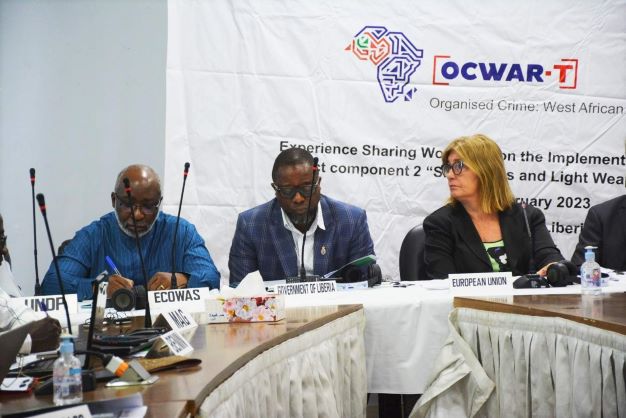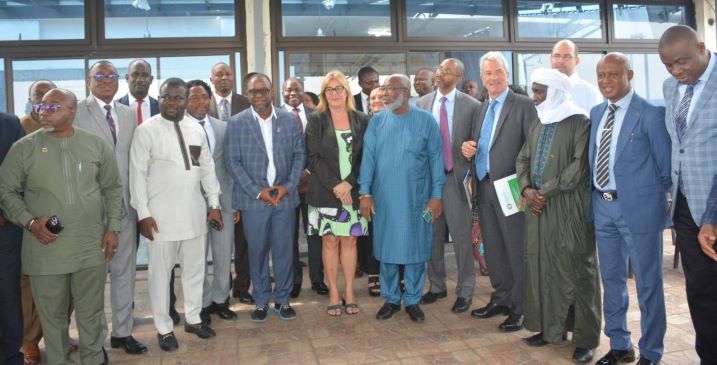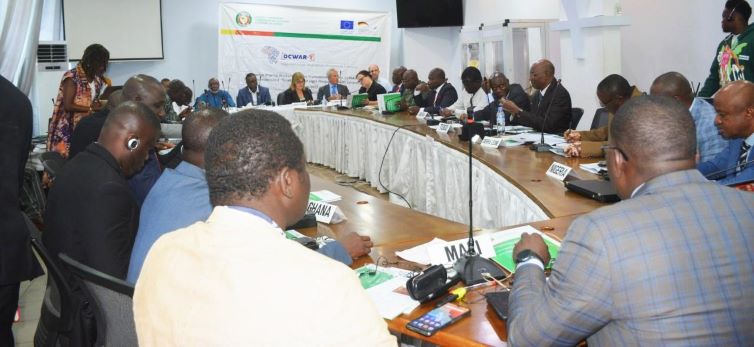Monrovia, Liberia– Liberia stands out for being the first country in the ECOWAS region to fully domesticate the Arms Trade Treaty by successfully amending the country’s Firearms and Ammunition Control Act 2015 to ensure it is fully aligned with the global Arms Trade Treaty.
The country has also repealed the Act establishing the Liberia National Commission on Small Arms (LiNCSA) and passed a new Act upgrading the mandate of the Commission to become the national competent authority for the control of all kinds of arms. – the Liberia National Commission on Arms (LiNCA).
“Liberia has taken a giant step towards meeting its Arms Trade Treaty obligations by harmonizing existing arms control legislation with the Arms Trade Treaty, and as a result the country now has an Arms Commission with a mandate that expands beyond small arms and light weapons,” said UNDP Resident Representative in Liberia, Stephen Rodriques.
Mr. Rodriques was speaking at the opening of a regional lessons learned conference on small arms and light weapons of the ECOWAS-EU Strengthening West African Institutions to Combat Illegal Trade/Organized Crime: West Africa Response to Trafficking (OCWAR-T) project.
The conference, convened by UNDP on 8th and 9th February in Monrovia, brought together 40 participants including heads of national small arms commissions from ECOWAS Member States and officials from the ECOWAS Commission, UNDP, European Union, the German Federal Government, GIZ and Mines Advisory Group (MAG).

The OCWAR-T project is a five-year initiative launched in 2019 with funding from the European Union (EU) and the Government of Germany with ECOWAS, GIZ, UNDP and the Mine Advisory Group (MAG) as implementing partners. The project has been working in ECOWAS member states to reduce trafficking in small arms by strengthening national laws to counter arms trafficking, building national awareness and capacity to deal with arms trafficking, and fostering cross-border cooperation to fight the illicit trade.
The leadership of the Liberia National Commission on Arms (LiNCA) has also been lauded for transforming the National Commission (NATCOM) on small arms and light weapons, which has positioned the country to attract the resources needed to effectively clamp down illicit arms flows and transfers within its territories.
“The upgrading of the Small Arms Commission into a fully-fledged Commission on all sorts of arms is very significant as it gives it gravitas to effectively control and mop up illicit weapons that could be used for criminal activities and destabilizing national and regional peace,” said UNDP’s Dakar-based Regional Small Arms and Light Weapons Specialist, Fred Appiah-Kusi.
The Executive-Director of LiNCA, Madam Vivian Dogbey reported that in 2022, Liberia seized 2,243 assorted weapons – 107 firearms and 2,136 rounds of ammunition, previously held as evidence for crimes committed, from the country’s courts and police depots in four counties.
“We found weapons presented as evidence for crimes stored in judges’ houses or police armories highlighting the challenges posed by the lack of Standards of Practice (SOPs) for weapons seized and recovered from crime scenes. There has been a longstanding controversy among criminal justice actors (judges, police, etc.) who have jurisdiction over such arms,” she said.

“There is a need to formulate SOPs for the management of seized and recovered weapons from crime scenes to address questions of processing, custody, storage, and disposal after adjudication of court cases,” Madam Dogbey added.
Last year, Liberia destroyed 105,503 assorted weapons comprising 381 firearms, 105,032 rounds of ammunition and 82 explosives, including arms collected over the years under the OCWAR-T project, and the AU-UN “Silencing the Guns” campaign, which every September grants amnesty to gun holders to surrender illicit guns without legal or criminal consequences.
Madam Dogbey said Liberia had accomplished much in its efforts to control arms because of sustained engagement with the relevant stakeholders including the Presidency, the Legislature, civil society, the media, and security and judicial actors in the country.
Mr. Joseph Ahoba, head of the ECOWAS Commission Small Arms Division said illicit economies, instability and conflict in West Africa are closely inter-related because instability creates conducive conditions for criminal trade in arms to thrive, which in turn fuels instability. He said arms trafficking was fueling organized crime and conflict in the region.
The Ambassador of Germany to Liberia Dr. Jakob Haselhuber said: “In the last decades, transnational organized crime has become a growing cause of concern to West Africa. Illicit trafficking in drugs, human beings and in particular firearms is challenging the progress towards good governance and undermining the rule of law. It poses a significant threat to economic and human development as well as peace and stability in the region.”
The EU Representative at the meeting, Ms. Stefania Marrone, said: “It is crucial to promote a multi-dimensional understanding of transnational organized crimes and support dialogue between countries for a clearer understanding of the dangers of illicit arms trafficking, which threaten the gains of peace, security, governance and development.”

